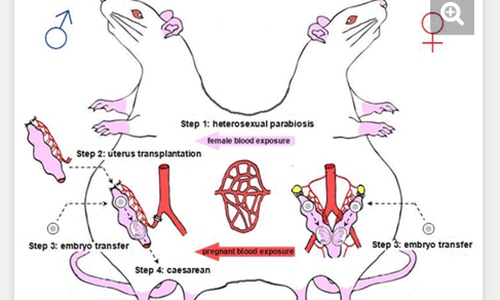Scientist urges public not to bring non-scientific issues into research amid ethical controversy over pregnant male rat experiment

Photo: screenshot of the research paper
The Chinese scientists who published a research study about constructing a rat model of pregnancy in a male parabiont have reportedly tried to retract the paper amid soaring ethical controversy, but later changed their mind and sent a letter to stop the retraction.
However, the Global Times reporter found that on bioRvix – an open access preprint repository for the biological sciences where the scientists published the paper – the first author Zhang Rongjia “sent a letter to stop the retraction, but doesn’t know whether the retraction will be stopped.”
As of press time, the full text of the paper is still accessible on bioRvix.
“We are just ordinary scientific researchers who do experiments. We also plead to the outside world not to bring issues other than scientific problems into scientific research,” Zhang told the Global Times on Wednesday via e-mail.
When asked about the reason for stopping the retraction, Zhang replied, “It is not convenient for us to answer now, but we will give a reply at an appropriate time. Please wait patiently and give us more time.”
Zhang, from the Shanghai-based Second Military Medical University, and Liu Yuhuan, from Shanghai-based Changhai Hospital, are the authors of the paper, titled “A rat model of pregnancy in the male parabiont” published on June 16 on bioRvix.
The success rate of the experiment was very low at only 3.68 percent, but a total of 10 cubs were successfully delivered from male parabionts by Caesarean section, who grew to adulthood, said the paper.
The paper soon sparked a huge backlash among the public, as many people believed that the cost for the experimental animals behind the "male rat pregnancy" is too high, the value of the experiment is low and the experiment is not in line with ethical norms.
"It added to the suffering of the animals and was contrary to the purpose of the experiment by using multiple female rats for uterus transfer, embryo transfer and conjoined bonding in order to impregnate one male rat,” Yang Yihua, a deputy director of the Research Center of Reproductive Medicine at the First Affiliated Hospital of Guangxi Medical University, was cited as saying by The-Intellectual, a non-governmental new media outlet for science, on Wednesday.
Zhang told Global Times that they have contacted The-Intellectual over the media report, saying the media outlet has realized that the report was inconsistent with the facts.
Many netizens also joined the debate over the paper, discussing the possibility of “male pregnancy.”
“My first thought about the paper is whether it would make it through the ethical review. The experiment diagram left a really terrible impression on me,” said one netizen.
“The rats in the whole experimental process were in great pain, and I don’t understand the point of this experiment,” another netizen commented.
“We didn't expect such a large number of non-scientific comments, and we really don't want to expand the unnecessary controversy,” said Zhang in her reply on bioRvix. “To be honest, we did nothing wrong, just performed an animal experiment.”
Zhang said that the inspiration of the experiment came from “a heterochronic parabiosis mouse model” when she read about “Science’s top 10 scientific and technological breakthroughs.”
Speaking of the dispute over animal ethics, she said that they kept “the number of animals used as low as possible” and “reduced animal pain as much as possible.”
